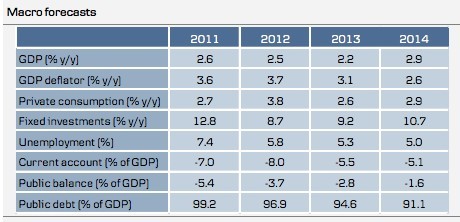 Icelandic authorities have stated that negotiations on EU membership will be suspended until the national referendum on this issue. Iceland is one of few countries in Europe that continue to maintain an independent political and economic course.
Icelandic authorities have stated that negotiations on EU membership will be suspended until the national referendum on this issue. Iceland is one of few countries in Europe that continue to maintain an independent political and economic course.
The small island nation, which before the financial crisis of 2008 was named by UN as "the best country to live", still prefers to go its own way of development.
The head of formed this week new government coalition Sigmundur David Gunnlaugsson said that the process of negotiations on Iceland's EU membership is stopped and will not resume as long as the national referendum will be held. Authorities have not yet determined the timing of the referendum.
According to numerous polls, most Icelanders stand for continuation of the cooperation with the EU but at the same time expressed a strong opinion against joining the European Union. The latest polls show that an overwhelming number of respondents – 63.3% - is against Iceland's EU membership.
For many Icelanders the turning point in the question of accession to the EU is the financial crisis. Until 2009, the majority of respondents were in favor of the European Union. The debt crisis, which broke out later in the euro area, as well as the financial collapse of Cyprus, has changed an attitude towards EU.
However, it is noted that joining the EU could bring significant benefits to Iceland's foreign exchange regulation but it may jeopardize its fishing industry because of specific European quotas in that field.
In addition, the European way looks less attractive because of the expanding crisis in the euro zone. However, the position of the new government means that the new coalition will have to find alternative ways to resolve the issue of normalization of country’s monetary policy, which has some problematic issues.
Recall that April's parliamentary elections in Iceland were won by the center-right opposition of the Progressive Conservative Party and the Independence Party. Both parties have promised to restore economic growth and to withdraw the application of Iceland to join the EU.
Taking into account the increasing number of eurosceptics in the region, the growing distrust towards EU's institutions and positive signs in the U.S. economy, it can be assumed that the prospects for the Euro at the moment are pretty vague.
Iceland's recovery and forecasts for 2013/2014







